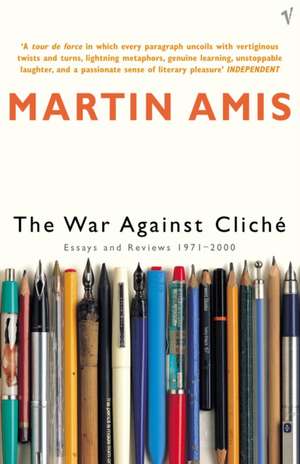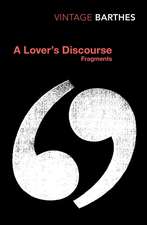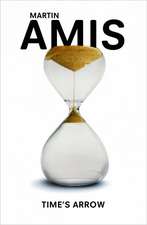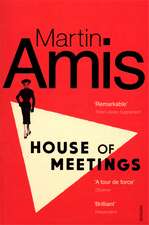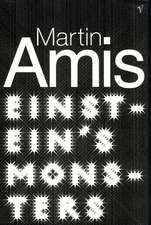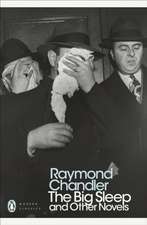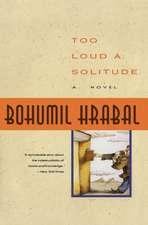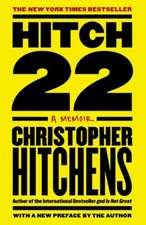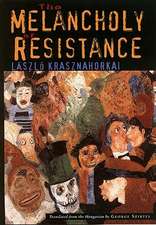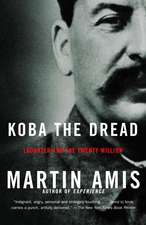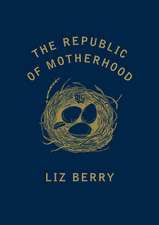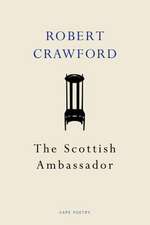The War Against Cliche
Autor Martin Amisen Limba Engleză Paperback – 7 mar 2002
| Toate formatele și edițiile | Preț | Express |
|---|---|---|
| Paperback (2) | 80.75 lei 25-31 zile | +30.26 lei 6-12 zile |
| Vintage Publishing – 7 mar 2002 | 80.75 lei 25-31 zile | +30.26 lei 6-12 zile |
| Vintage Publishing – 30 iun 2002 | 147.13 lei 22-36 zile |
Preț: 80.75 lei
Preț vechi: 95.73 lei
-16% Nou
Puncte Express: 121
Preț estimativ în valută:
15.46€ • 16.79$ • 12.99£
15.46€ • 16.79$ • 12.99£
Carte disponibilă
Livrare economică 03-09 aprilie
Livrare express 15-21 martie pentru 40.25 lei
Preluare comenzi: 021 569.72.76
Specificații
ISBN-13: 9780099422228
ISBN-10: 0099422220
Pagini: 528
Ilustrații: illustrations
Dimensiuni: 131 x 197 x 37 mm
Greutate: 0.37 kg
Editura: Vintage Publishing
Locul publicării:United Kingdom
ISBN-10: 0099422220
Pagini: 528
Ilustrații: illustrations
Dimensiuni: 131 x 197 x 37 mm
Greutate: 0.37 kg
Editura: Vintage Publishing
Locul publicării:United Kingdom
Notă biografică
Martin Amis is the best-selling author of several books, including London Fields, Money, The Information, and, most recently, Experience. He lives in London.
Extras
While complacently planning this volume in my mind I always thought I would include a nice little section called — let us say — 'Literature and Society', where I would assemble my pieces on literature and society (pieces on F.R. Leavis and Lionel Trilling, and on lesser figures like Ian Robinson an Denis Donoghue). 'Literature and society' was, at one time, a phrase so much on everyone's lips that it earned itself an abbreviation: Lit & Soc. And Lit & Soc, I seemed to remember, had been for me a long-running enthusiasm. But when I leafed through the massed manuscripts I found only a handful of essays, all of them written, rather ominously, in the early Seventies (when I was in my early twenties). Having reread them, I toyed with the idea of calling my nice little section something like 'Literature and Society: The Vanished Debate'. Then I decided that my debate had better vanish too. The pieces themselves I considered earnest, overweening, and contentedly dull. More decisively, though, Lit & Soc, and indeed literary criticism, felt dead and gone.
That time now seems unrecognizably remote. I had a day job at the Times Literary Supplement. Even then I sensed discrepancy, as I joined an editorial conference (to help prepare, perhaps, a special number on Literature and Society), wearing shoulder-length hair, a flower shirt, and knee-high tricoloured boots (well-concealed, it is true, by the twin tepees of my flared trousers). My private life was middle-bohemian — hippyish and hedonistic, if not candidly debauched; but I was very moral when it came to literary criticism. I read it all the time, in the tub, on the tube; I always had about me my Edmund Wilson — or my William Empson. I took it seriously. We all did. We hung around the place talking about literary criticism. We sat in pubs and coffee bars talking about W.K. Wimsatt and G. Wilson Knight, about Richard Hoggart and Northrop Frye, about Richard Poirier, Tony Tanner and George Steiner. It might have been in such a locale that my friend and colleague Clive James first formulated his view that, while literary criticism is not essential to literature, both are essential to civilization. Everyone concurred. Literature, we felt, was the core discipline; criticism explored and popularized the significance of that centrality, creating a space around literature and thereby further exalting it. The early Seventies, I should add, saw the great controversy about the Two Cultures: Art v. Science (or F.R. Leavis v. C.P. Snow). Perhaps the most fantastic thing about this cultural moment was that Art seemed to be winning.
Literary historians know it as the Age of Criticism. It began, let us suggest, in 1948, with the publication of Eliot's Notes Towards the Definition of Culture and Leavis's The Great Tradition. What ended it? The brutalist answer would consist of a singe four-letter word: OPEC. In the Sixties you could live on ten shillings a week: you slept on people's floors and sponged off your friends and sang for your supper — about literary criticism. Then, abruptly, a bus fare cost ten shillings. The oil hike, and inflation, and then stagflation, revealed literary criticism as one of the many leisure-class fripperies we would have to get along without. Well, that's how it felt. But it now seems clear that literary criticism was inherently doomed. Explicitly or otherwise it had based itself on a structure of echelons and hierarchies; it was about the talent elite. And the structure atomized as soon as the forces of democratization gave their next concerted push.
Those forces — incomparably the most potent in our culture — have gone on pushing. And they are now running up against a natural barrier. Some citadels, true, have proved stormable. You can become rich without having any talent (via the scratchcard and the rollover jackpot). You can become famous without having any talent (by abasing yourself on some TV nerdothon: a clear improvement on the older method of simply killing a celebrity and inheriting the aura). But you cannot become talented without having any talent. Therefore, talent must go.
Literary criticism, now almost entirely confined to the universities, thus moves against talent by moving against the canon. Academic preferment will not come from a respectful study of Wordsworth's poetic; it will come from a challenging study of his politics — his attitude to the poor, say, or his unconscious 'valorization' of Napoleon; and it will come still faster if you ignore Wordsworth and elevate some (justly) neglected contemporary, by which process the canon may be quietly and steadily sapped. A brief consultation of the Internet will show that meanwhile, at the other end of the business, everyone has become a literary critic — or at least a book-reviewer. Democratization has made one inalienable gain: equality of the sentiments. I think Gore Vidal said this first, and he said it, not quite with mockery, but with lively scepticism. He said that, nowadays, nobody's feelings are more authentic, and thus more important, than anybody else's. This is the new credo, the new privilege. It is a privilege much exercised in the contemporary book-review, whether on the Web or in the literary pages. The reviewer calmly tolerates the arrival of the new novel or slim volume, defensively settles into it, and then sees which way it rubs him up. the right way or the wrong way. The results of this contact will form the data of the review, without any reference to the thing behind. And the thing behind, I am afraid, is talent, and the canon, and the body of knowledge we call literature.
From the Hardcover edition.
That time now seems unrecognizably remote. I had a day job at the Times Literary Supplement. Even then I sensed discrepancy, as I joined an editorial conference (to help prepare, perhaps, a special number on Literature and Society), wearing shoulder-length hair, a flower shirt, and knee-high tricoloured boots (well-concealed, it is true, by the twin tepees of my flared trousers). My private life was middle-bohemian — hippyish and hedonistic, if not candidly debauched; but I was very moral when it came to literary criticism. I read it all the time, in the tub, on the tube; I always had about me my Edmund Wilson — or my William Empson. I took it seriously. We all did. We hung around the place talking about literary criticism. We sat in pubs and coffee bars talking about W.K. Wimsatt and G. Wilson Knight, about Richard Hoggart and Northrop Frye, about Richard Poirier, Tony Tanner and George Steiner. It might have been in such a locale that my friend and colleague Clive James first formulated his view that, while literary criticism is not essential to literature, both are essential to civilization. Everyone concurred. Literature, we felt, was the core discipline; criticism explored and popularized the significance of that centrality, creating a space around literature and thereby further exalting it. The early Seventies, I should add, saw the great controversy about the Two Cultures: Art v. Science (or F.R. Leavis v. C.P. Snow). Perhaps the most fantastic thing about this cultural moment was that Art seemed to be winning.
Literary historians know it as the Age of Criticism. It began, let us suggest, in 1948, with the publication of Eliot's Notes Towards the Definition of Culture and Leavis's The Great Tradition. What ended it? The brutalist answer would consist of a singe four-letter word: OPEC. In the Sixties you could live on ten shillings a week: you slept on people's floors and sponged off your friends and sang for your supper — about literary criticism. Then, abruptly, a bus fare cost ten shillings. The oil hike, and inflation, and then stagflation, revealed literary criticism as one of the many leisure-class fripperies we would have to get along without. Well, that's how it felt. But it now seems clear that literary criticism was inherently doomed. Explicitly or otherwise it had based itself on a structure of echelons and hierarchies; it was about the talent elite. And the structure atomized as soon as the forces of democratization gave their next concerted push.
Those forces — incomparably the most potent in our culture — have gone on pushing. And they are now running up against a natural barrier. Some citadels, true, have proved stormable. You can become rich without having any talent (via the scratchcard and the rollover jackpot). You can become famous without having any talent (by abasing yourself on some TV nerdothon: a clear improvement on the older method of simply killing a celebrity and inheriting the aura). But you cannot become talented without having any talent. Therefore, talent must go.
Literary criticism, now almost entirely confined to the universities, thus moves against talent by moving against the canon. Academic preferment will not come from a respectful study of Wordsworth's poetic; it will come from a challenging study of his politics — his attitude to the poor, say, or his unconscious 'valorization' of Napoleon; and it will come still faster if you ignore Wordsworth and elevate some (justly) neglected contemporary, by which process the canon may be quietly and steadily sapped. A brief consultation of the Internet will show that meanwhile, at the other end of the business, everyone has become a literary critic — or at least a book-reviewer. Democratization has made one inalienable gain: equality of the sentiments. I think Gore Vidal said this first, and he said it, not quite with mockery, but with lively scepticism. He said that, nowadays, nobody's feelings are more authentic, and thus more important, than anybody else's. This is the new credo, the new privilege. It is a privilege much exercised in the contemporary book-review, whether on the Web or in the literary pages. The reviewer calmly tolerates the arrival of the new novel or slim volume, defensively settles into it, and then sees which way it rubs him up. the right way or the wrong way. The results of this contact will form the data of the review, without any reference to the thing behind. And the thing behind, I am afraid, is talent, and the canon, and the body of knowledge we call literature.
From the Hardcover edition.
Recenzii
"Irresistible. . . . The man's a genius with words. . . . Whatever Amis has to say about a book or a writer seems just right--and lip smackingly phrased." --The Washington Post
“Brilliant prose. . . .[Amis] proselytizes for talent by demonstrating it, by doing it. . . . He is a master.” –The New York Times Book Review
"Whatever the book, there is no one whose review of it you'd rather read than Amis's. His prose is always buzzing, so much so that he doesn't just review books, he rewrites them." --San Francisco Chronicle
"[Written] with intelligence and ardor and panache. . . . Speaks not just to a lifetime of reading but also to a fascination with individual writers mature." --The New York Times
“Brilliant prose. . . .[Amis] proselytizes for talent by demonstrating it, by doing it. . . . He is a master.” –The New York Times Book Review
"Whatever the book, there is no one whose review of it you'd rather read than Amis's. His prose is always buzzing, so much so that he doesn't just review books, he rewrites them." --San Francisco Chronicle
"[Written] with intelligence and ardor and panache. . . . Speaks not just to a lifetime of reading but also to a fascination with individual writers mature." --The New York Times
